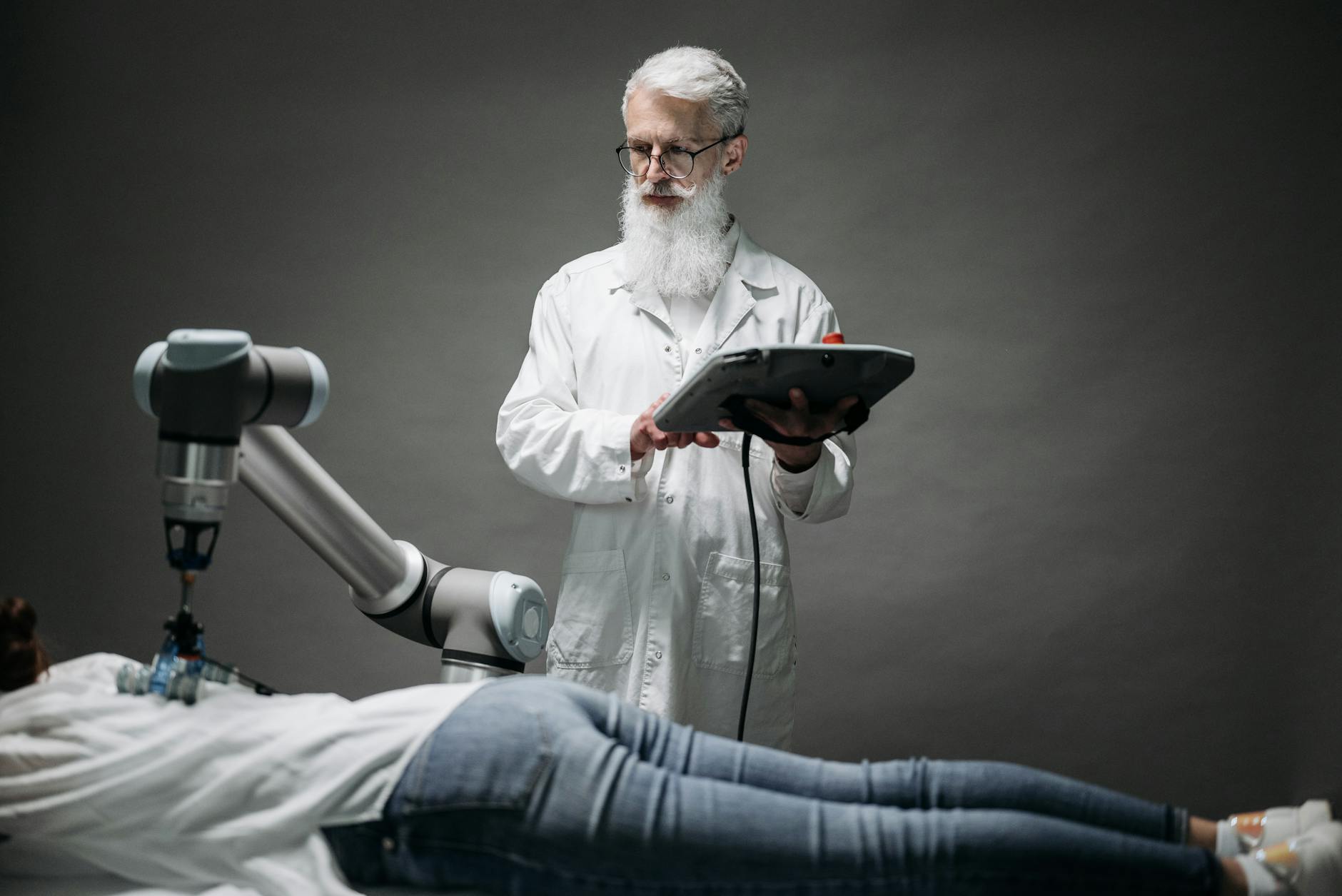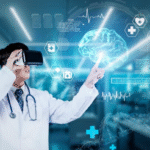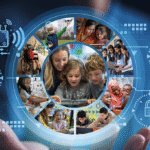Introduction
Imagine a world where AI isn’t just a buzzword, but an integral part of our daily lives. 🤖 Fast Future of AI in 2025, and this reality is closer than you think. From revolutionizing healthcare to transforming education, artificial intelligence is poised to reshape every aspect of our society in ways we’re only beginning to comprehend.
But with great power comes great responsibility. As AI continues to evolve at breakneck speed, we find ourselves at a critical juncture. Will we harness its potential to solve some of humanity’s most pressing challenges, or will we fall victim to unforeseen consequences? The future of AI in 2025 is both thrilling and daunting, filled with endless possibilities and potential pitfalls. Future of AI in 2025.
In this blog post, we’ll explore the cutting-edge advancements in AI technology and their far-reaching implications across various sectors. From healthcare and business to education and transportation, we’ll delve into how AI is set to revolutionize these industries. We’ll also tackle the crucial ethical considerations and regulations that must keep pace with these rapid developments. So, buckle up as we embark on a journey to uncover the fascinating future of AI in 2025! Future of AI in 2025.

Advancements in AI Technology
Quantum AI: Revolutionizing Computing Power
Quantum AI is set to redefine the capabilities of artificial intelligence by 2025. By harnessing the power of quantum computing, AI systems will be able to process vast amounts of data at unprecedented speeds, solving complex problems that were previously intractable. Future of AI in 2025.
Natural Language Processing Breakthroughs
Natural Language Processing (NLP) is expected to reach new heights, enabling AI to understand and generate human language with near-native proficiency. This advancement will revolutionize human-computer interaction, making AI assistants more intuitive and capable of handling nuanced communication.
Enhanced Computer Vision Capabilities
Computer vision will see significant improvements, allowing AI to interpret and analyze visual data with human-like accuracy. This will have far-reaching implications in fields such as autonomous vehicles, medical imaging, and surveillance systems.
Emotion AI and Sentiment Analysis
The development of Emotion AI will enable machines to recognize, interpret, and respond to human emotions. This technology will enhance customer service, mental health support, and personalized user experiences across various platforms.
| AI Technology | Current State (2023) | Expected Advancements (2025) |
|---|---|---|
| Quantum AI | Experimental | Commercial applications |
| NLP | Advanced | Near-human proficiency |
| Computer Vision | Highly capable | Human-like accuracy |
| Emotion AI | Emerging | Widespread integration |
- Key benefits of AI advancements:
- Faster problem-solving in complex domains
- More natural and intuitive human-AI interactions
- Enhanced decision-making in visual-based tasks
- Improved emotional intelligence in AI systems
As we look towards the future, these advancements in AI technology will set the stage for transformative changes across various sectors, including healthcare, which we’ll explore next. Future of AI in 2025.
AI in Healthcare
As we explore the future of AI in 2025, one of the most promising areas of advancement is healthcare. The integration of AI technologies in medical practices is set to revolutionize patient care, diagnosis, and treatment.
A. Personalized Medicine and Treatment Plans
AI-driven algorithms will analyze vast amounts of patient data, including genetic information, lifestyle factors, and medical history, to create highly personalized treatment plans. This approach will significantly improve patient outcomes and reduce adverse drug reactions.
B. AI-powered Diagnostic Tools
Advanced AI systems will enhance the accuracy and speed of medical diagnoses. These tools will analyze medical images, lab results, and patient symptoms to provide rapid and precise diagnoses, potentially detecting diseases at earlier stages.

| AI Diagnostic Tool | Primary Function | Potential Impact |
|---|---|---|
| Deep Learning Imaging | Analyzes medical scans | Earlier detection of cancers |
| Natural Language Processing | Interprets patient symptoms | Faster triage in emergency rooms |
| Predictive Analytics | Identifies high-risk patients | Proactive preventive care |
C. Robot-assisted Surgeries
AI-guided robotic systems will assist surgeons in performing complex procedures with greater precision and minimal invasiveness. These systems will enhance surgical outcomes, reduce recovery times, and lower the risk of complications. Future of AI in 2025.
D. Mental Health Support through AI Chatbots
AI-powered chatbots will provide 24/7 mental health support, offering:
- Immediate crisis intervention
- Cognitive behavioral therapy exercises
- Mood tracking and analysis
- Personalized coping strategies
These advancements in AI-driven healthcare will not only improve patient outcomes but also alleviate the burden on healthcare systems, making quality care more accessible and efficient.
AI in Business and Finance
By 2025, AI is expected to revolutionize the business and finance sectors, offering unprecedented opportunities for efficiency, accuracy, and innovation. Let’s explore how AI will transform various aspects of these industries. Future of AI in 2025.
Automated Decision-Making Systems
AI-powered automated decision-making systems will become increasingly sophisticated, enabling businesses to make faster and more accurate decisions. These systems will analyze vast amounts of data in real-time, considering multiple variables to provide optimal solutions.
Predictive Analytics for Market Trends
AI algorithms will excel at predicting market trends, giving businesses a competitive edge. By analyzing historical data, current market conditions, and external factors, AI will provide invaluable insights for strategic planning.

| AI Capability | Business Impact |
|---|---|
| Real-time data analysis | Faster decision-making |
| Pattern recognition | Accurate trend prediction |
| Multi-variable consideration | Comprehensive market understanding |
AI-driven Customer Service Solutions
Customer service will be transformed by AI-powered chatbots and virtual assistants. These systems will:
- Provide 24/7 support
- Handle multiple inquiries simultaneously
- Offer personalized recommendations
- Learn from each interaction to improve service quality
Fraud Detection and Cybersecurity
AI will play a crucial role in enhancing financial security. Advanced machine learning algorithms will:
- Detect unusual patterns in transactions
- Identify potential security breaches in real-time
- Adapt to new fraud techniques as they emerge
As we move forward, the integration of AI in transportation and logistics will further enhance the efficiency of global business operations. Future of AI in 2025.
AI in Education
Now that we’ve explored AI’s impact on business and finance, let’s examine how it’s revolutionizing education. By 2025, AI is set to transform the learning experience in unprecedented ways.
Personalized Learning Experiences
AI-powered systems will analyze student data to create tailored learning paths, ensuring each student progresses at their optimal pace. This personalization extends to:
- Content delivery
- Difficulty levels
- Learning styles
Intelligent Tutoring Systems
Virtual AI tutors will provide 24/7 support, answering questions and offering explanations in real-time. These systems will:
- Adapt to individual learning styles
- Identify knowledge gaps
- Offer targeted practice exercises
Automated Grading and Feedback
AI algorithms will streamline assessment processes, providing:
- Instant grading for objective questions
- Detailed feedback on essays and projects
- Plagiarism detection

Virtual Reality and Augmented Reality in Classrooms
Immersive technologies will enhance learning experiences:
| Technology | Application |
|---|---|
| VR | Virtual field trips, historical recreations |
| AR | Interactive 3D models, real-time information overlay |
These advancements will make education more engaging, efficient, and accessible. As we move forward, it’s crucial to consider the ethical implications of AI in education.
Ethical Considerations and Regulations
As AI continues to advance rapidly, it’s crucial to address the ethical implications and establish robust regulatory frameworks. Let’s explore the key aspects of AI ethics and governance that will shape the landscape in 2025. Future of AI in 2025.
AI Governance Frameworks
AI governance frameworks will become increasingly sophisticated by 2025, with international cooperation playing a vital role. These frameworks will aim to:
- Ensure transparency in AI decision-making processes
- Establish accountability measures for AI developers and users
- Promote responsible AI development and deployment
| Framework Component | Purpose |
|---|---|
| Ethical Guidelines | Define acceptable AI behavior |
| Auditing Mechanisms | Assess AI systems for compliance |
| Certification Programs | Validate AI solutions for public use |
Addressing Bias in AI Algorithms
Combating bias in AI algorithms will be a top priority. Efforts will focus on:
- Diverse data collection and representation
- Regular bias audits and testing
- Implementing fairness-aware machine learning techniques
Privacy Concerns and Data Protection
As AI systems become more pervasive, protecting individual privacy will be paramount. Key measures will include:
- Stricter data protection laws and regulations
- Advanced encryption and anonymization techniques
- User-controlled AI data management systems
Job Displacement and Economic Impact
The potential for AI-driven job displacement will necessitate proactive measures:
- Reskilling and upskilling programs for affected workers
- Universal Basic Income (UBI) pilot programs
- AI-human collaboration incentives for businesses
Human-AI Collaboration Models
Developing effective human-AI collaboration models will be crucial for maximizing the benefits of AI while mitigating risks. These models will focus on
- Augmenting human capabilities rather than replacing them
- Ensuring human oversight in critical decision-making processes
- Fostering a symbiotic relationship between humans and AI systems
As we move forward, the next section will delve into how AI is revolutionizing transportation and logistics, building upon the ethical foundations discussed here.
Conclusion
As we look ahead to Future of AI in 2025, it’s clear that artificial intelligence will continue to reshape numerous aspects of our lives. From groundbreaking advancements in healthcare and education to transformative applications in business, finance, and transportation, AI’s impact will be far-reaching and profound. The technology’s potential to drive environmental sustainability efforts and optimize logistics further underscores its importance in addressing global challenges. Future of AI in 2025.
However, as AI becomes more ingrained in our daily lives, we must remain vigilant about ethical considerations and the need for robust regulations. Striking a balance between innovation and responsible development will be crucial to harnessing AI’s full potential while safeguarding society’s interests. As we embrace this AI-driven future, it’s essential for individuals, businesses, and policymakers to stay informed and actively participate in shaping the responsible growth of this transformative technology. Future of AI in 2025.








1 thought on “Exploring the Future of AI in 2025: What’s Next for Artificial Intelligence?”